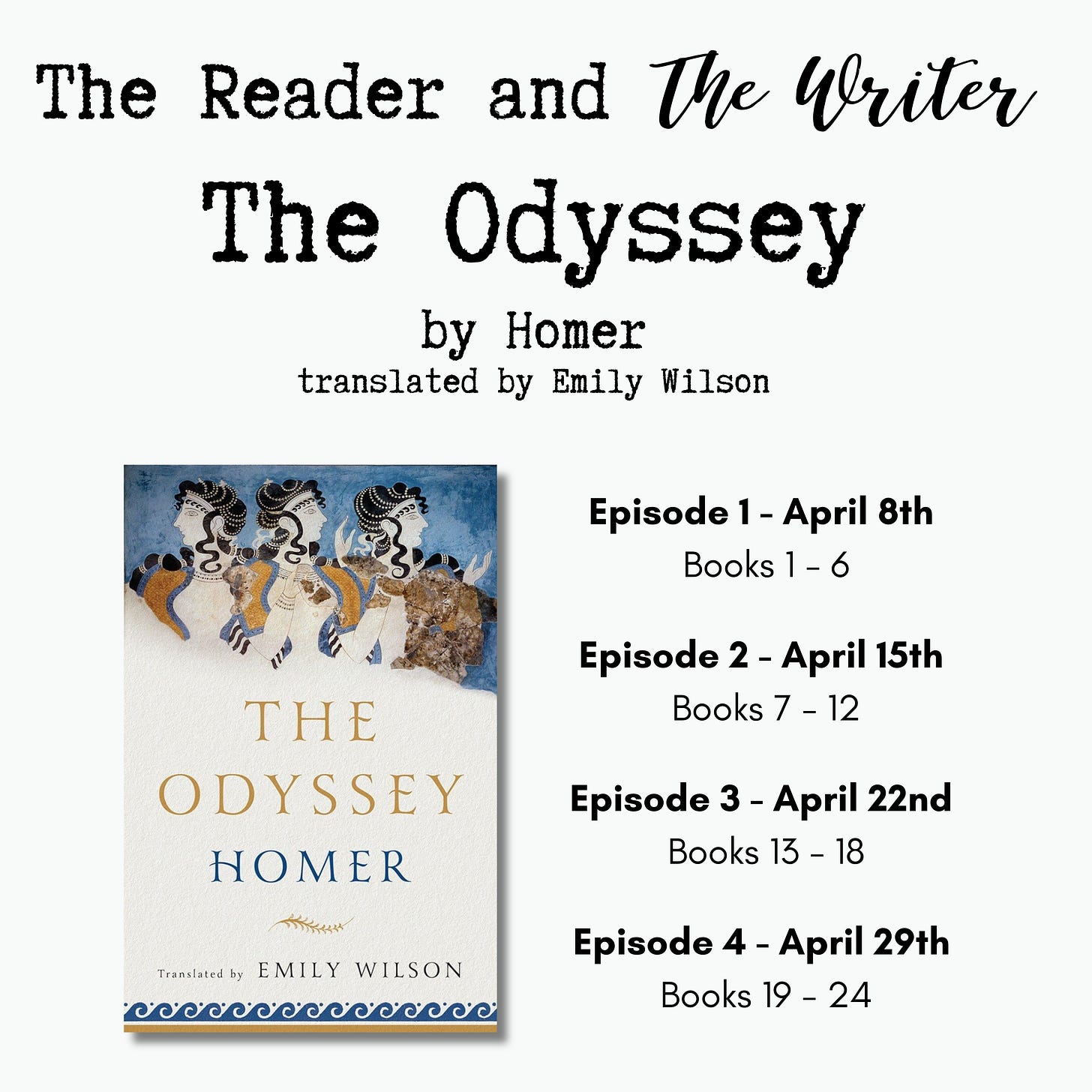Join us for The Odyssey by Homer, translated by Emily Wilson
Our next book on The Reader and the Writer is the epic poem The Odyssey by Homer, translated by Emily Wilson.
and I can’t wait to dive into this classic, and we hope you’ll join us this month! Our first episode airs April 8th.The poem opens with the line, “Tell me about a complicated man.” The further I read, the more fitting that description becomes.
Below, you’ll find a book description, our reading schedule, and helpful resources I explored before reading. Extra research isn’t necessary, but these links are great for those who enjoy deeper dives. The book’s introduction and translator’s notes also provide valuable background—while lengthy, both provide an excellent understanding of the poem and Wilson’s approach.
About the Book (Courtesy of Goodreads):
The first great adventure story in the Western canon, The Odyssey is a poem about violence and the aftermath of war; about wealth, poverty, and power; about marriage and family; about travelers, hospitality, and the yearning for home.
In this fresh, authoritative version--the first English translation of The Odyssey by a woman--this stirring tale of shipwrecks, monsters, and magic comes alive in an entirely new way. Written in iambic pentameter verse and a vivid, contemporary idiom, this engrossing translation matches the number of lines in the Greek original, thus striding at Homer's sprightly pace and singing with a voice that echoes Homer's music.
Wilson's Odyssey captures the beauty and enchantment of this ancient poem as well as the suspense and drama of its narrative. Its characters are unforgettable, from the cunning goddess Athena, whose interventions guide and protect the hero, to the awkward teenage son, Telemachus, who struggles to achieve adulthood and find his father; from the cautious, clever, and miserable Penelope, who somehow keeps clamoring suitors at bay during her husband's long absence, to the "complicated" hero himself, a man of many disguises, many tricks, and many moods, who emerges in this translation as a more fully rounded human being than ever before.
Ekphrastic Writing & Connections to War & Peace:
If you’re also reading War and Peace this year, keep an eye out for connections between the two books—both in themes and narrative style. Notice how each author explores family, loyalty, and homecoming. The parallels will be interesting to compare!
Last week, Shari posted an article on ekphrastic writing. If you’re new to this literary style, like me, be sure to check out “Ekphrastic Writing—Ekphrastic Life.” If you’re already familiar with ekphrasis, you’ll enjoy, “Ekphrastic Practice,” which offers practical ways to engage with this form. Both are great resources as you explore The Odyssey and War and Peace!
Let’s Share the Journey!
Both Shari and I would love to hear your thoughts on The Odyssey as we go along. Feel free to share insights, questions, or reactions as we read—it’s always more fun when we do it together! Let’s chat in the comments or join our chat thread on The Reader & the Writer Page.
~Rhea & Shari
Reading Schedule & Links
To support your reading journey, you'll find our four-week reading schedule below, along with helpful links that provide valuable background and information about key concepts covered in The Odyssey.
Emily Wilson’s Website:
Wilson’s website offers a wealth of useful information from pronunciation guides to dramatic readings from each book. The dramatic readings are brilliant and truly showcase her personality and deep passion for this epic poem.
Dramatic Readings (I love these!)
The video below is Professor Wilson speaking about her translation. The Q&A at the end is quite interesting. At the 18:00 mark, she discusses the style of her translation. This was one of my favorite parts.
Links that will provide helpful information:
-
is spending a year reading both The Iliad and The Odyssey. He is currently reading The Iliad. His page is filled with valuable resources. Here is the direct link to his “Reading Homer” page. If you are not already following Matthew, I highly suggest it!Xenia- this is an overview provided by Wikipedia. This practice of xenia will come up often within the narrative.
The Trojan War- History.com provides a simple overview of the Trojan War.
Greek Mythology- Histoy.com offers a spoiler-free list of gods and goddesses along with basic information about Greek mythology.
Get Your Copy of The Odyssey:
Do you need a copy of the book? Here are a couple of options
Bookshop.org (This link supports Goldberry Books & Close Reads Podcast)
Audible (I have this audiobook. While it’s not bad, I do not enjoy listening to this one. I don’t think it has anything to do with the actor reading—Claire Danes; I just find it hard to follow the story while listening.)









